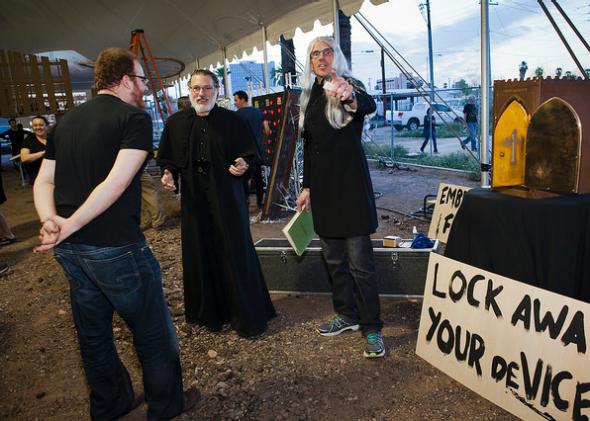A voice cries out in the desert:
“Know thyself, not thy selfies!”
“Digital media will not save you!”
“The zero is not whole and the one is not The One!”
Technically, we’re not in the desert—we’re in a dusty parking lot in downtown Phoenix. And the voice is not coming from the Prophet Isaiah, but from professor Ron Broglio, whom I’ve ordained as a Minister of the Digital Tabernacle. As people wander into the massive circus tent at Arizona State University’s Emerge: Carnival of the Future, they are greeted by a pair of shifty evangelists preaching the analog Word. (Disclosure: ASU is a partner with Slate and the New America Foundation in Future Tense.)
“Confess your digital sins! Lock away your devices!”
How do people react? Mostly with terror. Not only are they being hailed unexpectedly by black-robed zealots who aren’t afraid to point fingers and make full eye contact. But they are also being asked to partake in a ritual that threatens the very core of their daily existence. In short, we are beseeching them to give up their handheld devices and experience a small portion of their lives as analog penitents, free of digital mediation.
Behold the sacred liturgy of the Digital Tabernacle:
1) Penitent submits device to the ministers.
2) Ministers read prayer of analog blessing and lock device in Tabernacle.
3) Penitent receives prayer card to provoke analog contemplation.
4) After a while, penitent returns to Tabernacle and confesses digital sins.
5) Ministers read prayer of analog absolution.
6) Ministers cleanse device with Holy Spray and Sacred Cloth of Rubbing.
7) Ministers return device to penitent.
Yes, it’s basically a device coat-check and cleaning service. But there’s something more serious happening here.
At Emerge, the ministers absolved every filthy digital sin that came their way, from “I don’t email my mother often enough” to “I sleep with my device under my pillow even though I know it’s bad for me.” Some penitents experienced an epiphany at the Digital Tabernacle. As one righteous soul proclaimed: “I was arrogant and thought that I was in control. But it turns out that I needed an education. I could barely survive 30 minutes away from my device. Now I know better and I have nothing but gratefulness in my heart.” Amen, brother! We all have insecurities about our reliance on digital devices, a nagging sense that we are slowly losing our souls—but few of us are prepared to admit it.
In a short essay written in 1957, Marshall McLuhan foresaw a “Liturgical Revival” in which electronic media would create new cultural rituals. Today, as we relentlessly consume new media products and services, we simultaneously adopt new rituals and communal practices without even considering their impacts on our brains, bodies, and souls—let alone our physical environments. Digital Tabernacle sheds light on our digital habits, and offers a space for contemplation in a world of online distraction, neuromarketing, and psychotechnology. The project asks us to create new rituals that will save us from the tarnation of digital (de)vices.
I should add that although the Tabernacle preaches digital abstinence, it is not immune to the sin of irony. We preachers wore Autographer lifelogging cameras, which I hacked to look like crosses.

Photo by Marcel O’Gorman.
A full photo stream of the event can be viewed here. Still, whenever a digital recording device was pointed our way, the ministers reproached it sternly with an outstretched finger and the words: “Don’t document! Repent!” This drove many a digital heathen to flee in fear.
Digital Tabernacle is a prelude to a large-scale project called “12 Tabernacles for the Contemplation of Digital Abstinence.” You can follow its development here. Rest assured, this mysterious installation will not be free of digital sin. Look not to the cloud of data, my brothers and sisters. Look to the cloud of unknowing.
